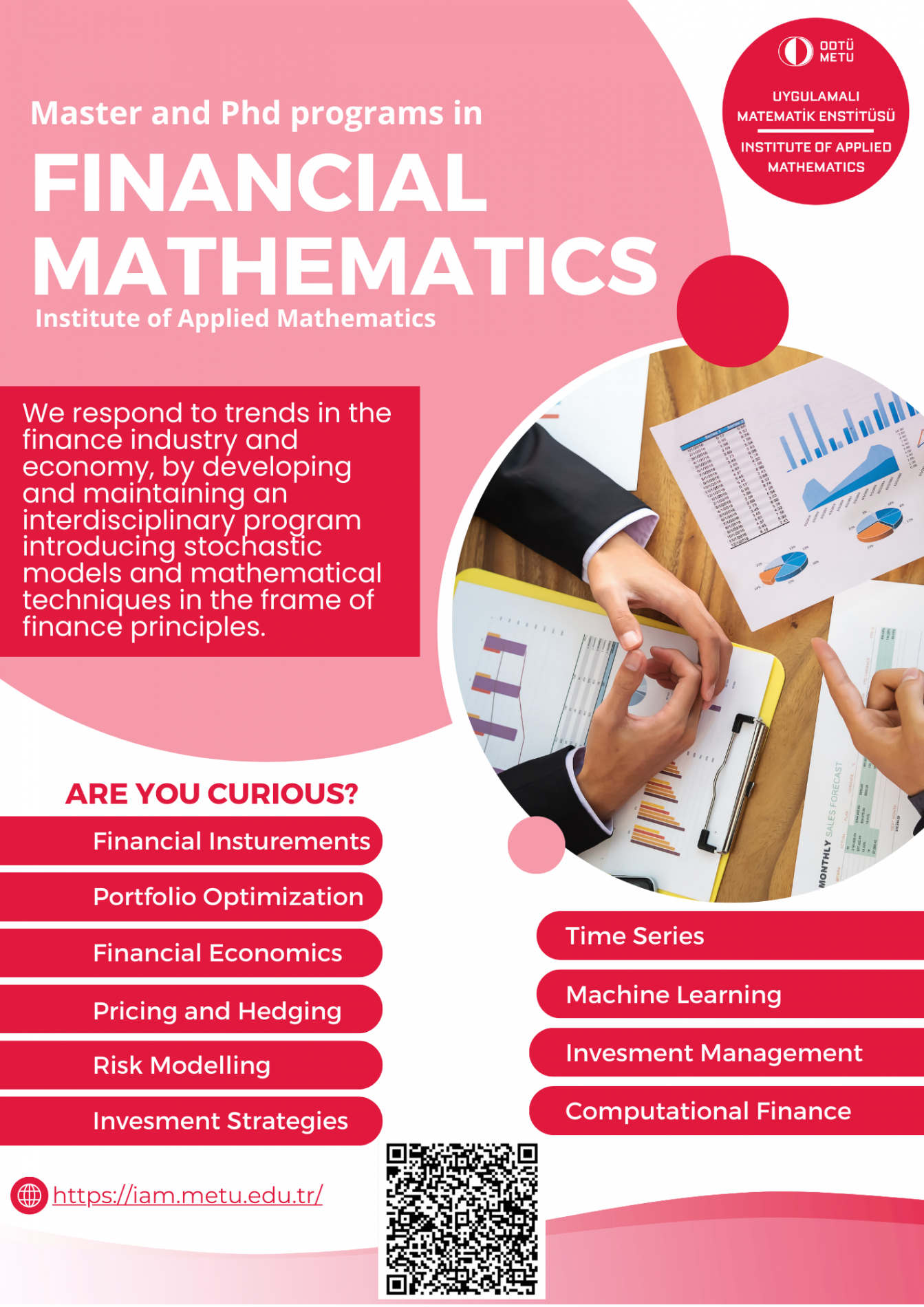Financial Mathematics
Last Updated:
- English
- Türkçe

Introduction (Financial Mathematics)
The last decades witnessed a strong insertion of refined mathematical techniques into the center of the financial industry. In the 1980's, the main investment banks started to employ mathematicians, physicists and engineers to become "financial engineers". Gradually, the main skills defining this professional category became clarified and, in our present time, many universities in all over the world are designing and updating programs in order to convey, enhance and implement high mathematical expertise about modeling, valuing and optimizing in financial applications.
In Turkey, the financial sector has enjoyed an unparalleled expansion during the last decades; more and more, powerful and efficient financial instruments are expected to enter the financial sector in the forthcoming years. Already there have been serious attempts to integrate derivative securities and markets into our domestic financial system. The worldwide financial crises which occurred in 2008, underlined the need for intensified mathematical research and education efforts on a new financial market analytics, on early-warning and decision-making systems in the presence of high stochastic uncertainty. All these developments will lead to a further demand for talented and enthusiastic young people who are trained in the field of Financial Mathematics.
The Institute of Applied Mathematics (IAM), ever since its establishment in 2002, has been responding to this emerging trend in the Turkish finance industry and economy, by developing and maintaining an interdisciplinary program that is introducing students to stochastic models and mathematical techniques used in option pricing, pricing of other complex financial products, portfolio optimization and control, and to financial decision aiding in the sectors of energy and environment. The Financial Mathematics program at IAM combines the strengths of the Departments of Mathematics, Business Administration, Economics, Statistics, Physics and Industrial Engineering of Middle East Technical University, and it closely collaborates with Centers of Excellence worldwide.
One of the fields connected to Financial Mathematics is Actuarial Sciences and its academic program at IAM. By analyzing uncertainty of real-life events, actuaries create and apply mathematical tools which aim at detecting, modeling and overcoming of risks.

Objectives
- To provide students with the knowledge and skills which are necessary for comprehending and applying established and emerging techniques of Financial Mathematics and related fields in modern markets;
- To cultivate the students’ ability in creating new, innovative techniques;
- To analyze, advise and manage financial markets in Turkey and in the world;
- To conduct research on risk modeling and management, modelling of stochastic processes, pricing and hedging, portfolio optimization and stochastic control, and on the development of new financial decision-making tools;
- To present and discuss new scientific results and methods at international conferences, in premium journals and books, to initiate future research cooperation, and to contribute to a solution of urgent financial challenges.
Degrees Offered
- MSc with Thesis in Financial Mathematics
- MSc without Thesis in Financial Mathematics
- PhD in Financial Mathematics
- Integrated PhD in Financial Mathematics
See Curricula for Financial Mathematics or see Academic Catalogue at METU.
Admission
The admission procedure of these programs will be implemented according to the “Academic Rules and Regulations Concerning Graduate Studies of METU”. However, some programs might have additional admission requirements. University graduates of any discipline willing to acquire expertise in financial mathematics are natural candidates for these programs. These programs are also open to graduates working in financial and insurance industries. In general, the applicants will be evaluated based on their success in their graduation fields, their ALES/GRE (Graduate Education Examination) scores, English Proficiency, and the result of a possible examination/interview given by the Institute.
The program is equally suitable for students who have just finished their undergraduate education or for practitioners in financial industry holding a Bachelor degree. Applicants must have a strong academic background showing good analytical skills. The applicants are expected to have working knowledge of calculus (including partial differentiation, Taylor series, Riemann-Stieltjes integrals), linear algebra (systems of equations, determinants, diagonalization of symmetric matrices, eigenvalues, etc.), elementary theory of ordinary and partial differential equations, in addition to some basic knowledge of computer programming. Course work or job experience in probability is also recommended. A promising student lacking prerequisites may be admitted but required to take the summer Mathematics Preparatory Course (MPC) before beginning the program.
Contact
Download the flyers, summarizing the Financial Mathematics Program at IAM, in English
